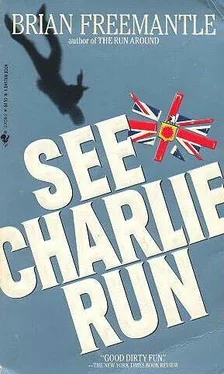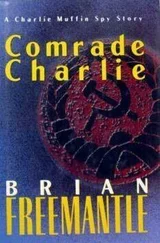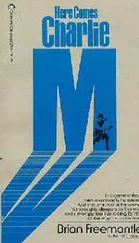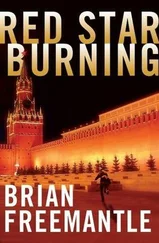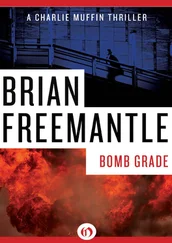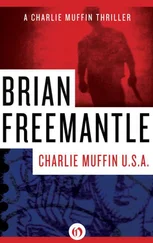Brian Freemantle - See Charlie Run
Здесь есть возможность читать онлайн «Brian Freemantle - See Charlie Run» весь текст электронной книги совершенно бесплатно (целиком полную версию без сокращений). В некоторых случаях можно слушать аудио, скачать через торрент в формате fb2 и присутствует краткое содержание. Жанр: Шпионский детектив, на английском языке. Описание произведения, (предисловие) а так же отзывы посетителей доступны на портале библиотеки ЛибКат.
- Название:See Charlie Run
- Автор:
- Жанр:
- Год:неизвестен
- ISBN:нет данных
- Рейтинг книги:4 / 5. Голосов: 1
-
Избранное:Добавить в избранное
- Отзывы:
-
Ваша оценка:
- 80
- 1
- 2
- 3
- 4
- 5
See Charlie Run: краткое содержание, описание и аннотация
Предлагаем к чтению аннотацию, описание, краткое содержание или предисловие (зависит от того, что написал сам автор книги «See Charlie Run»). Если вы не нашли необходимую информацию о книге — напишите в комментариях, мы постараемся отыскать её.
See Charlie Run — читать онлайн бесплатно полную книгу (весь текст) целиком
Ниже представлен текст книги, разбитый по страницам. Система сохранения места последней прочитанной страницы, позволяет с удобством читать онлайн бесплатно книгу «See Charlie Run», без необходимости каждый раз заново искать на чём Вы остановились. Поставьте закладку, и сможете в любой момент перейти на страницу, на которой закончили чтение.
Интервал:
Закладка:
Those sections of Soviet embassies occupied by the KGB — and by the Glavnoye Razvedyvatelnoye Upravleniye or GRU, the military branch of Russian intelligence — are internally the most restricted, without exception anywhere in the world forbidden to any ambassador or any supposedly genuine diplomatic staff. Intelligence personnel are an elite — as they are, indeed, within the Soviet Union — answerable to no one, beholden to no one. Except within their own rigidly enforced, rigidly observed confines, where KGB informs upon KGB and GRU informs upon GRU and each service informs upon the other. Ostensibly, for each service, there is a Rezident or chief, but so well is a tangled intricacy of suspicion constantly maintained that no Rezident knows whether he truly occupies the office or whether someone he considers his subordinate is in fact the real holder of the position, reporting upon him and monitoring his performance. The situation is further complicated by the official existence within each branch of the service in every embassy of a security officer, who is not responsible to the Rezident — and certainly not to the ambassador — reporting and monitoring as actively and as independently as everyone else.
The same-colour jigsaw creates the maximum suspicion and uncertainty, and the Soviet Politburo remain convinced since 1953, when Nikita Krushchev innovated the system, that it has preserved their intelligence organizations against dissent and defection better than any other in the world. Statistics of known defections appear to support that confidence.
Boris Filiatov was officially the KGB Rezident in Tokyo, but the security officer was a woman whose reputation was such that the majority of Tokyo-based Russian agents believed that Olga Balan was the bona fide Rezident, unencumbered by any unknown superior. Olga — whose job it was to know of these and other rumours — did nothing to discount them, because she enjoyed the respect and because it encouraged the informants to confide their secrets to her, which increased her reputation and revolved the wheel of rumour full circle. The earned reputation for ruthless determination contrasted with Olga Balan’s obvious and real femininity. She was taller than most Slavic women and she did not have the usual square-jawed features either, but a soft, oval face and a cowl of blonde hair: those who feared her complained her very appearance made her all the more frightening, because it concealed the sort of person she really was. The stories positively identified two agents who had been sent to number 27 gulag in the Potma complex upon her evidence of their enjoying too much the pleasures of the West and involving themselves in the black market, to guarantee some comforts back in Moscow against the time of their recall. They were true. One had been her fiance, for whom she had genuine affection and whom she had therefore warned several times to stop before filing her report. If she hadn’t, she knew someone else would have done, and she did not want to occupy a prison cell herself, either for failing properly to do her job or because of her known involvement with the man. Olga Balan regarded being a good Russian as more important than being a loyal fiancee, and anyway towards the end she found the man sexually lacking.
Olga conducted everything to order and most of all the weekly meetings. Kozlov entered precisely on time, because such things were noted, exchanged the formalized greeting and sat in the already arranged chair. Each KGB officer maintained a work-log, which was required to be submitted the morning in advance of the afternoon encounter; his was open in front of the woman.
‘Kamakura?’ she said, looking up at him. She had deep brown eyes.
‘Yes,’ said Kozlov. ‘A day visit.’
‘Why?’ She had an unnerving, staccato way of questioning.
‘We are maintaining observation on CIA personnel attached to the American embassy here. A joint operation with my wife, approved by Moscow. I was following their Resident, Art Fredericks,’ said Kozlov, pedantically. All interviews were recorded.
‘It appears to be taking a long time.’
‘We isolated another one, at Kamakura. Samuel Dale. We’ve confirmed it from their diplomatic list.’ He spoke intentionally in the plural.
‘Your wife is Control for this operation?’
‘She suggested it to Moscow,’ said Kozlov. ‘They approved.’
‘How is it worked?’
‘The object is identification,’ said Kozlov. ‘I maintain observation on known CIA officers and through them discover others.’
‘You operate as a team?’ persisted the woman.
‘We do not remain all the time together,’ qualified Kozlov. ‘That would be dangerous.’
‘Why dangerous?’
‘In the event of one of us being identified, leading to the other,’ said Kozlov.
‘You suspect your identities are known to a Western intelligence agency!’ The demand was peremptory.
‘I consider separation a sensible precaution,’ said Kozlov, qualifying again.
‘Any findings, from this surveillance?’
‘I believe there is a build up of CIA strength,’ said Kozlov.
‘Why!’ demanded the woman.
‘I hope to find out,’ said Kozlov.
Fredericks sanitized his account to the other CIA operatives, but even so it was clear that the Agency supervisor had conceded more than he wanted, in the encounter with Charlie Muffin.
‘Was it right, to disclose Ogurtsov?’ questioned Elliott.
‘Do you think I’d have done it, if it hadn’t been necessary!’ said Fredericks, upset at the obvious criticism from the other men.
‘He winked!’ said Levine. ‘The bastard winked at the monitor!’
‘Listen. And listen good,’ instructed Fredericks. ‘Don’t let tricks like that upset you. Because that’s what they are: nothing more than tricks.’
‘Why?’ questioned Yamada.
‘So we’ll underestimate him,’ judged Fredericks. ‘And that would be a mistake. We all know what he did once. He’s a tricky son-of-a-bitch.’
Chapter Six
Charlie opened the first Suntory, closed the curtains against the intrusive glitter of the night-time awakening of Tokyo and sat at the desk facing the blank wall, paper and pen before him. As he set out the preparations, Charlie guessed Witherspoon would go apeshit at his writing down in insecure surroundings the conclusions of a secure briefing. It transgressed every regulation codified in the British intelligence system since Walsingham founded it after Queen Elizabeth I agreed it was a good idea if it singled out the bad guys in the black hats from the good guys, wearing the white ones, although not quite in those words. At least after four hundred years the principle remained the same. It was a pity, he reflected further, that the assholes who sat in panelled offices with the very pictures of Lord Walsingham and Queen Elizabeth I on the walls got their colours and images blurred and relied too much upon those old school ties when it came to judging Blunt and Cairngorm and Philby and Burgess and Maclean, and all the others who’d made the service a bad joke as well as an object of suspicion among other intelligence organizations. Was he one of the others, minus that all-important school tie? Charlie asked himself. Certainly Fredericks thought so; which showed clearly enough the thinking within the American agency. Rubbish, of course: absolute rubbish. He’d never been a traitor — just vindictive — and proved his right to re-entry in a Moscow operation that would have worked if Wilson had at the time trusted him completely. Not just a professional loss, either: personal, as well. Darling, wonderful Natalia who had refused to come back with him …
Consciously, as he had before, Charlie closed his mind to the distraction, concentrating upon what he’d got from the meeting with Fredericks. Which had been a hell of a lot. Charlie wrote ‘Leningrad 1940’ as a reminder for the major calculation he had to make, qualifying it at once by noting that he would be working from the birth dates which Kozlov provided, which might for any number of reasons be inaccurate. Against it he put 1983, which appeared to be a positive date because Fredericks insisted he’d checked Kozlov’s arrival with the Japanese Foreign Ministry records. Forty-three years then from the time of the man’s birth and his posting to Tokyo. In between which he’d worked in London and Bonn. And killed. Kozlov would not have been chosen for KGB training until high school or early university entry. Eighteen was the average, for initial entry. From his unsuccessful Moscow infiltration, Charlie knew there were two years of aptitude testing and training before specialized selection in the Soviet service. Full instruction took two years. And in the case of Department V, from which men emerged assassins, there was a further year of psychological evaluation, to guard against breakdown and the sort of revulsion from which Kozlov appeared to be suffering. Charlie added up a total from his jottings, did a quick subtraction from the forty-three and came out with a figure of twenty. There would not have been an immediate posting. Charlie reckoned he could afford to build in an extra year — maybe two — before Kozlov would have been judged safe for overseas service. Which gave him the date of 1963. Where? During the interview Fredericks had said London first, then Bonn. Was that the way Kozlov itemized the tours? Or the way Fredericks had translated them, because he was talking to an Englishman and London would have come more obviously to his mind? No way of knowing. Certainly not of checking with the American because it might show him the way. Thank God for computers, thought Charlie. He circled 1963 as the date from which London would have to start checking any suspicious political, trade union or expatriate dissident deaths and then considered the way the search could be narrowed. Fredericks had been insistent, more than once, that Kozlov’s name appeared on no diplomatic register or list in England or West Germany. But Russians serving at Highgate or with international commercial organizations like the Wheat Council were not accredited diplomats and therefore did not appear on any such lists. Any more than they did in Germany. It was an unlikely oversight, but Charlie was well aware how rigidly requests relayed through headquarters from one overseas intelligence Residency to another overseas intelligence Residency were frequently interpreted; asked to check diplomatic lists they only checked diplomatic lists, without spreading the enquiry further. Charlie wrote the unanswered questions on the page in front of him, listing identity first. Fredericks had twisted and turned and tried to avoid giving anything away. So had he been lying, in insisting they hadn’t found a trace of the man, anywhere? Or had they covered the trade outlets after all and maybe come up with some sort of cover posting in the United States, despite Fredericks’ denial? Maybe even knew someone he’d killed there? To his English and German checklist of trade missions Charlie added those in America and then made a further addition not just of the US diplomatic list but that of the United Nations in New York.
Читать дальшеИнтервал:
Закладка:
Похожие книги на «See Charlie Run»
Представляем Вашему вниманию похожие книги на «See Charlie Run» списком для выбора. Мы отобрали схожую по названию и смыслу литературу в надежде предоставить читателям больше вариантов отыскать новые, интересные, ещё непрочитанные произведения.
Обсуждение, отзывы о книге «See Charlie Run» и просто собственные мнения читателей. Оставьте ваши комментарии, напишите, что Вы думаете о произведении, его смысле или главных героях. Укажите что конкретно понравилось, а что нет, и почему Вы так считаете.
